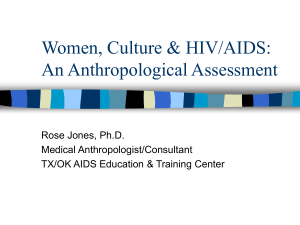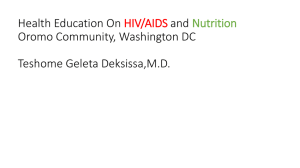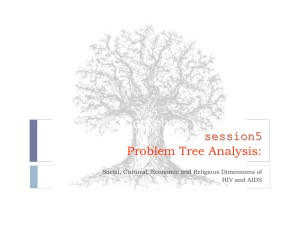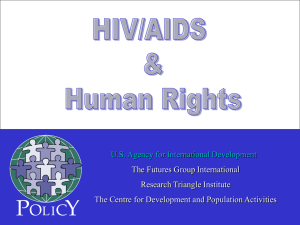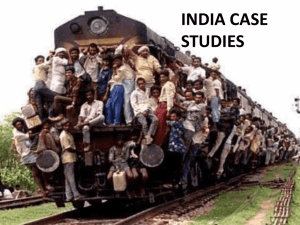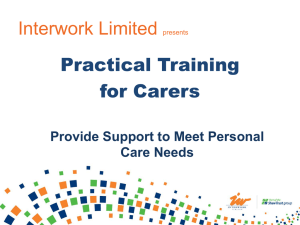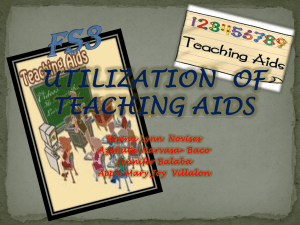World AIDS Day
advertisement
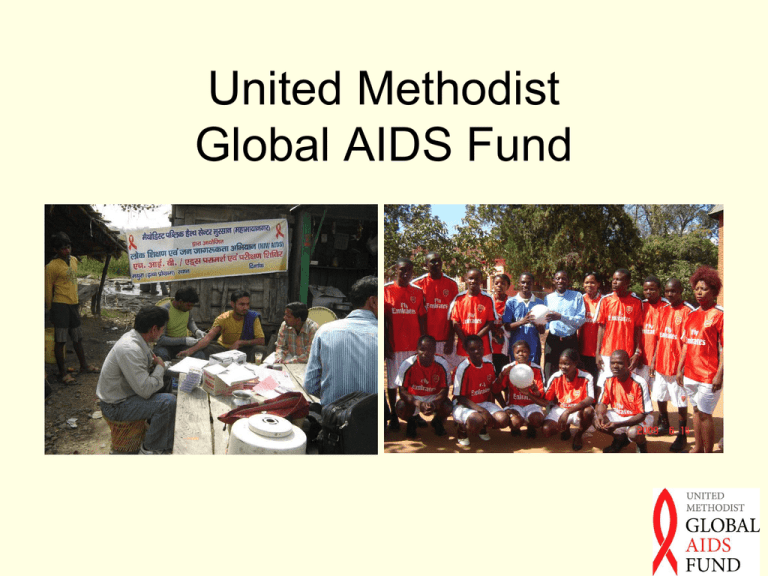
United Methodist Global AIDS Fund AIDS is a Global Problem • 33 million people have HIV/AIDS • About 1.1 million people in the U.S. are living with diagnosed or undiagnosed HIV/AIDS • Africa has 11.6 million AIDS orphans. • Every 6 seconds new HIV infections occur • 22 million have HIV/AIDS in sub-Sahara Africa The Centers for Disease Control and Prevention and Joint United Nations Programme on HIV/AIDS Paul’s Words Galatians 4:13-14 (NLT) “Surely you remember that I was sick when I first brought you the Good News of Christ. But even though my sickness tempted you to reject me, you did not despise me or turn me away. No, you took me in and cared for me as though I were an angel from God or even Christ Jesus himself.” Compassionate Response • United Methodists are responding to the HIV/AIDS crisis through the United Methodist Global AIDS Fund. • The fund was established at the 2004 General Conference to raise $8 million. Supported Global AIDS Fund Projects 2005-2008 • 78 projects in sub-Saharan Africa • 23 projects in Asia • 5 projects in Latin America & the Caribbean • 3 projects had an international reach -----------109 projects in 30 countries United Methodist Commitment • $8 million represents a $1 commitment of every United Methodist in the U.S. • To support education and prevention programs. • 25% of Global AIDS Funds raised in each annual conference are used by that conference for AIDS-related work. It’s something the church can do so well… Cries From the Heart • "I cried daily and had nightmares of taking my body apart and rinsing each and every part under hot water, even using bleach.“ Robert Sullivan, an HIV/AIDS survivor in the U.S. • "Over the years, the HIV/AIDS issue has been one of my passions. It's a preventable disease. It bothers me so much. We, as a church have fallen behind in doing our part to educate. We need to step up.“ Rev. Mary Bullis, Desert Southwest Conference AIDS Task Force chairperson • “These existing prevention strategies can be very effective in reducing the risk of HIV exposure, but, there's more work to be done in training others so that each person can inform another.“ Dr. Kasanka Mwan Ngoie, a Global Ministries’ Missionary for North Katanga Annual Conference, DRC • “The impact of HIV/AIDS is devastating our community especially within African Americans. HIV/AIDS is the number one killer for both African American men and women between the ages of 25 and 44.” Schaunta James-Boyd, Saint Mark United Methodist Church, Wichita, Kansas United Method Global AIDS Fund Programs 1. Education and prevention 2. Testing and counseling 3. Health care and support for people living with HIV/AIDS 4. Care of orphans and vulnerable children 5. Advocacy Education and Prevention 1. Education and Prevention • More than one-third of funds go to support education and prevention. • Education is offered in schools, churches, hospitals, and communities—under trees, at truck stops, on streets through drama— wherever people meet, however they can understand, remember, and pass on the information. • Community health workers and youth are trained to reach their communities. • They promote abstinence, faithfulness, and the use of condoms. • Measures are taken to prevent motherto-child transmission of the virus. Testing …and Counseling 2. Testing and Counseling Benter Adhimabo shares her story from Kenya: “My husband succumbed to HIV/AIDS, but we did not know the cause of his ailment. Later, I started having ill health and became bedridden. A community health worker from St. Paul’s Methodist Health Center asked me to get tested. I was positive. Now, I am healthy. I have a successful business thanks to a grant and training I received from St. Paul’s. I want to tell people that those with HIV/AIDS can live positively.” “People with HIV/AIDS can live positively” Benter Adhiambo received prevention of mother-to-child transmission services. In 2008, Adhiambo gave birth to a baby boy named Jared. Now 18 months old, Jared is HIV-negative and healthy. Health care and support for people living with HIV/AIDS 3. Health care and support • Community education and advocacy include people infected with and affected by the virus. • Health care and support includes treatment of related infections and health problems, including malnutrition. • People with HIV/AIDS are given a referral for antiretroviral therapy and follow-up. • They receive vocational training and employment opportunities. • They receive home-based care such as washing, cooking, bathing, and collecting firewood. Home-based care providers in Zambia are equipped to visit patients by bicycle. Mobile Medical Teams in Armenia test for HIV/AIDS and tuberculosis in high-risk areas. Orphans and Vulnerable Children Programs 4. Orphans and Vulnerable Children “I am the head girl of the orphanage. When my parents died of HIV/AIDS life became very difficult for me. From the time I joined the Front Porch Orphans group, I feel I am not an orphan because God has given me new parents who do everything I need in my life.” Lizzy Kaonga, an AIDS orphan in Zambia “God has given us new parents” Orphans and Vulnerable Children There are many facets of children’s needs: • A loving new home and community • Community selection that supports guardians and children • Formal and informal education • Vocational training and small loans • Orphans become their siblings’ parents Advocacy 5. Advocacy • Advocacy is about representing affected and infected people to their families, community and government. • Advocacy is working towards policies to protect people, provide services and opportunities. • Advocacy is securing financial and other types of assistance when work is no longer possible. There IS hope. AIDS is preventable. AIDS is treatable. And EVERYONE is acceptable. Respond to HIV/AIDS. Give to The United Methodist Global AIDS Fund UMCOR Advance #982345 www.umglobalaidsfund.org
